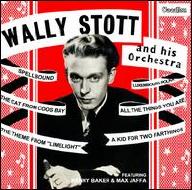Stott undertook his early studies at the Mexboro Academy, where he began collaborating regularly with the talented singer Tony Mercer. During this period, Mercer sang and played the piano and accordion, while Stott concentrated on the saxophone. Following the completion of their studies, both worked in bands such as Archie's Juveniles and Oscar Rabin's band. By 1944, Stott was leading the latter group's saxophone section on alto and had become the band's sole arranger. He then moved on to work in the band of the performer Geraldo, with whom he stayed until late 1948 at which point he left to devote his attention to arranging and film music work. In the early '50s, he became a main arranger for the Philips label along with talents such as Peter Knight and Ivor Raymonde. He arranged and conducted for many popular British artists over the next two decades, including Frankie Vaughan, Anne Shelton, Secombe, the Beverley Sisters, Roy Castle, Ronnie Carroll, Shirley Bassey, and many more. He also cut several of his own instrumental albums, sometimes utilizing a vocal chorus.
Stott began composing his own music early in his career as well, establishing himself with the BBC following the success of his theme for Hancock's Half Hour in 1954. He wrote a great number of popular mood music pieces, including Mock Turtles, Flight by Jet, Focus on Fashion, and Skylight. In the late '60s and early '70s, his career in films really took off. Stott wrote the music for #The Looking Class War, #Captain Nemo and the Underwater City, and #When Eight Bells Toll, and also scored a series of television productions. Having undergone a sex-change operation, credits under the new name of Angela Morley began appearing during the '70s, including two Academy Awards for her arrangements of Alan Jay Lerner and Frederick Loewe's score for #The Little Prince and Richard M. and Robert B. Sherman's score for #The Slipper and the Rose. Since the mid-'70s, the sexually refurbished Morley has been living in the United States. ~ Eugene Chadbourne, Rovi












